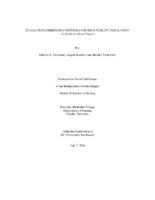Evaluating debriefing methods for high fidelity simulation
View File(s)
- Author(s)
- Details
-
Sabrina Glesmann, BSN, RN; Angela Kastner, BSN, RN; Monika Venteicher, BSN, RN
- Sigma Affiliation
- Non-member
Visitor Statistics
Visits vs Downloads
Visitors - World Map
Top Visiting Countries
| Country | Visits |
|---|
Top Visiting Cities
| City | Visits |
|---|
Visits (last 6 months)
Downloads (last 6 months)
Popular Works for Glesmann, Sabrina by View
| Title | Page Views |
|---|
Popular Works for Glesmann, Sabrina by Download
| Title | Downloads |
|---|
View Citations
Citations
The purpose of this study is evaluating effectiveness of debriefing. The PICO(T) question asks “for nurse educators debriefing in simulation (P) how does using the Debriefing for Meaningful Learning (DML) method (I) compared to other simulation debriefing methods (C) influence simulation debriefing effectiveness as evidenced by a debriefing evaluation?” Simulation creates problems for educators to ensure the experience meets best practice standards and guarantee quality learning opportunities. A comprehensive literature search was completed using online databases for evidenced based peer reviewed articles. Faculty driven debriefing, high-fidelity simulation, debriefing comparisons, effective debriefing, and the Debriefing for Meaningful Learning Method (DML) were inclusion criteria.
This work has been approved through a peer-review process prior to its posting in the Virginia Henderson Global Nursing e-Repository.
| Type | Thesis |
| Acquisition | Self-submission |
| Review Type | Peer-review: Single Blind |
| Format | Text-based Document |
| Evidence Level | Literature Review |
| Research Approach | N/A |
| Keywords | Simulation; Debriefing |
| CINAHL Subject(s) | Simulations; Student Performance Appraisal; Student Knowledge--Evaluation; Students, Nursing; Student Knowledge |
| Grantor | Nebraska Methodist College |
| Advisor | Smallwood, Christopher |
| Level | MSN |
| Year | 2016 |
All rights reserved by the author(s) and/or publisher(s) listed in this item record unless relinquished in whole or part by a rights notation or a Creative Commons License present in this item record.
All permission requests should be directed accordingly and not to the Sigma Repository.
All submitting authors or publishers have affirmed that when using material in their work where they do not own copyright, they have obtained permission of the copyright holder prior to submission and the rights holder has been acknowledged as necessary.
Related items
Showing items related by title, author, creator and subjects.
-
The influence of low- and high-fidelity simulations on nursing students' self-confidence, knowledge, and satisfaction
Milligan, Teena M.; Freda, Kaynabess R.; Seldomridge, Lisa A.A single-site study to seek understanding of how low and high-fidelity simulation experiences for first-year baccalaureate nursing students influenced student perceived self-confidence, knowledge about how to care for a ... -
Assessment of nursing students’ knowledge acquisition and knowledge retention regarding blood administration using high-fidelity simulation
Hooper, Barbara L.; Carlson, Nancy; Ware, KatelynThe purpose of this study was to measure knowledge acquisition and retention among nursing students participating in a blood administration simulation. Knowledge acquisition was measured with a pre-test prior to the ... -
The effect of high-fidelity simulation and traditional didactic lecture on first semester junior baccalaureate nursing students' knowledge acquisition, and self-confidence using the Solomon-Four Group research design
Williams, TrudyNurse educators are challenged with preparing nurses to practice in complex Health care settings. Nursing graduates often feel unprepared to meet the performance expectations placed on them by the Health care industry, ... -
The effect of high-fidelity simulation (HFS) on first semester baccalaureate nursing students' knowledge acquisition/self-confidence
Williams, TrudyThis presentation highlights the role of a HFS-focused respiratory physical assessment intervention in improving self-confidence and knowledge in undergraduate nursing students. The learner will be able discuss the benefits ... -
Effects of high fidelity simulation on knowledge acquisition, self-confidence, and satisfaction with baccalaureate nursing students using the Solomon-Four Research Design
Hall, Rachel Mattson (3/24/2015)High Fidelity Simulation is a teaching strategy that is becoming well-entrenched in the world of nursing education and is rapidly expanding due to the challenges and demands of the health care environment. The problem ...





